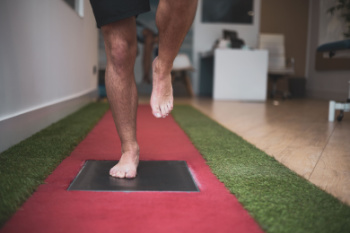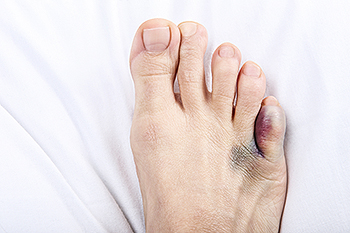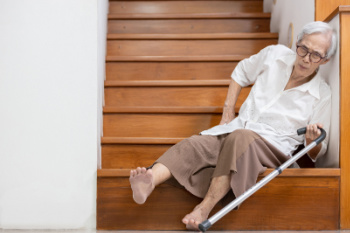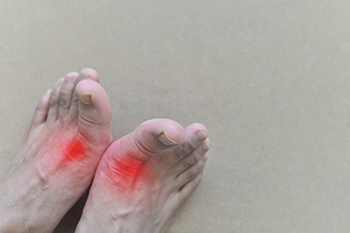Connect With Us
Blog
Items filtered by date: October 2024
Focus on Feet and Ankles for Good Running Form

Achieving proper running form is essential for enhancing performance and reducing the risk of injury, particularly when it comes to the feet and ankles. A key aspect of effective running is maintaining a midfoot strike, which helps to distribute impact evenly and minimize stress on the joints. Runners should aim to keep their feet directly beneath their bodies during each stride, promoting better alignment and balance. Additionally, maintaining a slight bend in the knees can prevent excessive strain on the ankles and feet. Strengthening the ankle muscles through exercises such as calf raises and ankle mobility drills can improve stability and support. Wearing proper footwear is also essential, as shoes should provide adequate cushioning and support based on individual foot mechanics. If you have sustained a foot or ankle injury while running, it is suggested that you consult a podiatrist who can guide you on techniques for proper running form.
If you have any concerns about your feet, contact one of our podiatrists from Garnet & Carbonell, DPM, LLC. Our doctors can provide the care you need to keep you pain-free and on your feet.
Biomechanics in Podiatry
Podiatric biomechanics is a particular sector of specialty podiatry with licensed practitioners who are trained to diagnose and treat conditions affecting the foot, ankle and lower leg. Biomechanics deals with the forces that act against the body, causing an interference with the biological structures. It focuses on the movement of the ankle, the foot and the forces that interact with them.
A History of Biomechanics
- Biomechanics dates back to the BC era in Egypt where evidence of professional foot care has been recorded.
- In 1974, biomechanics gained a higher profile from the studies of Merton Root, who claimed that by changing or controlling the forces between the ankle and the foot, corrections or conditions could be implemented to gain strength and coordination in the area.
Modern technological improvements are based on past theories and therapeutic processes that provide a better understanding of podiatric concepts for biomechanics. Computers can provide accurate information about the forces and patterns of the feet and lower legs.
Understanding biomechanics of the feet can help improve and eliminate pain, stopping further stress to the foot.
If you have any questions please feel free to contact our offices located in Palmetto Bay, South Miami, and Homestead, FL . We offer the newest diagnostic and treatment technologies for all your foot and ankle needs.
Why Does My Pinky Toe Hurt?

Pinky toe pain can be a frustrating and often overlooked issue, but it can stem from various causes. One common reason for this type of pain is footwear choice, as tight or ill-fitting shoes can compress the toes, leading to pain and discomfort. Conditions such as bunions or hammertoes can also affect the pinky toe, causing misalignment and resulting in chronic pain. Injuries like fractures or sprains from stubbing the toe or twisting the foot may lead to significant discomfort. Another potential cause is neuropathy, where nerve damage results in tingling or shooting pain in the toes. Inflammatory conditions like arthritis can further contribute to pinky toe pain, causing swelling and stiffness. If you have injured your pinky toe or have pain in this area of your foot, it is suggested that you consult a podiatrist who can treat it accordingly.
Toe pain can disrupt your daily activities. If you have any concerns, contact one of our podiatrists of Garnet & Carbonell, DPM, LLC. Our doctors can provide the care you need to keep you pain-free and on your feet.
What Causes Toe Pain?
Most severe toe pain is caused due to a sports injury, trauma from dropping something heavy on the toe, or bumping into something rigid. Other problems can develop over time for various reasons.
Toe pain can be caused by one or more ailments. The most common include:
- Trauma
- Sports injury
- Wearing shoes that are too tight
- Arthritis
- Gout
- Corns and calluses
- Hammertoe
- Bunions
- Blisters
- Ingrown toenails
- Sprains
- Fractures (broken bones)
- Dislocations
When to See a Podiatrist
- Severe pain
- Persistent pain that lasts more than a week
- Signs of infection
- Continued swelling
- Pain that prevents walking
Diagnosis
In many cases the cause of toe pain is obvious, but in others, a podiatrist may want to use more advanced methods to determine the problem. These can range from simple visual inspections and sensation tests to X-rays and MRI scans. Prior medical history, family medical history, and any recent physical traumatic events will all be taken into consideration for a proper diagnosis.
Treatment
Treatments for toe pain and injuries vary and may include shoe inserts, padding, taping, medicines, injections, and in some cases, surgery. If you believe that you have broken a toe, please see a podiatrist as soon as possible.
If you have any questions please feel free to contact our offices located in Palmetto Bay, South Miami, and Homestead, FL . We offer the newest diagnostic tools and technology to treat your foot and ankle needs.
When Diabetic Foot Wounds Do Not Heal

Diabetic foot wounds that do not heal can signal serious problems that require medical care from a podiatrist. Factors that delay wound healing include poor circulation, high blood sugar levels, and nerve damage. High blood sugar can interfere with the body’s ability to fight infections and slows down collagen production, which helps to close wounds. Poor circulation and nerve damage may reduce sensation, making it harder to notice and treat injuries early. Open wounds can become infected, worsening the condition and causing serious tissue damage. A podiatrist can check your circulation, offer specialized wound care, and suggest treatment methods to prevent complications. This may include techniques to reduce pressure on the wound or using advanced wound therapies. Early care and regular monitoring can help prevent further harm and avoid severe outcomes, such as amputation. If you have a foot wound that will not heal, it is suggested that you make an immediate appointment with a podiatrist.
Wound care is an important part in dealing with diabetes. If you have diabetes and a foot wound or would like more information about wound care for diabetics, consult with one of our podiatrists from Garnet & Carbonell, DPM, LLC. Our doctors will assess your condition and provide you with quality foot and ankle treatment.
What Is Wound Care?
Wound care is the practice of taking proper care of a wound. This can range from the smallest to the largest of wounds. While everyone can benefit from proper wound care, it is much more important for diabetics. Diabetics often suffer from poor blood circulation which causes wounds to heal much slower than they would in a non-diabetic.
What Is the Importance of Wound Care?
While it may not seem apparent with small ulcers on the foot, for diabetics, any size ulcer can become infected. Diabetics often also suffer from neuropathy, or nerve loss. This means they might not even feel when they have an ulcer on their foot. If the wound becomes severely infected, amputation may be necessary. Therefore, it is of the upmost importance to properly care for any and all foot wounds.
How to Care for Wounds
The best way to care for foot wounds is to prevent them. For diabetics, this means daily inspections of the feet for any signs of abnormalities or ulcers. It is also recommended to see a podiatrist several times a year for a foot inspection. If you do have an ulcer, run the wound under water to clear dirt from the wound; then apply antibiotic ointment to the wound and cover with a bandage. Bandages should be changed daily and keeping pressure off the wound is smart. It is advised to see a podiatrist, who can keep an eye on it.
If you have any questions, please feel free to contact our offices located in Palmetto Bay, South Miami, and Homestead, FL . We offer the newest diagnostic and treatment technologies for all your foot care needs.
It's Time for Beautiful Feet
A Guide for Seniors to Prevent Falls at Home

As seniors age, the risk of falling increases significantly, making home safety a vital concern. To reduce the likelihood of falls, it is essential to create a safe living environment. Begin by removing clutter from walkways and ensuring that rugs are secured or removed entirely to prevent tripping hazards. Good lighting is essential, and installing brighter bulbs and night lights in hallways and staircases can enhance visibility. Additionally, consider using non-slip mats in bathrooms and grab bars near toilets and in showers for added stability. Regular exercise can also improve balance and strength, further reducing the risk of falls. Wearing supportive shoes instead of slippers can provide better footing. Falling can seriously impact the feet, and may cause seniors to develop foot conditions. If this applies to you or someone you care of, it is suggested that you consult a podiatrist who can treat foot pain, and guide you toward effective fall prevention techniques.
Preventing falls among the elderly is very important. If you are older and have fallen or fear that you are prone to falling, consult with one of our podiatrists from Garnet & Carbonell, DPM, LLC. Our doctors will assess your condition and provide you with quality advice and care.
Every 11 seconds, an elderly American is being treated in an emergency room for a fall related injury. Falls are the leading cause of head and hip injuries for those 65 and older. Due to decreases in strength, balance, senses, and lack of awareness, elderly persons are very susceptible to falling. Thankfully, there are a number of things older persons can do to prevent falls.
How to Prevent Falls
Some effective methods that older persons can do to prevent falls include:
- Enrolling in strength and balance exercise program to increase balance and strength
- Periodically having your sight and hearing checked
- Discuss any medications you have with a doctor to see if it increases the risk of falling
- Clearing the house of falling hazards and installing devices like grab bars and railings
- Utilizing a walker or cane
- Wearing shoes that provide good support and cushioning
- Talking to family members about falling and increasing awareness
Falling can be a traumatic and embarrassing experience for elderly persons; this can make them less willing to leave the house, and less willing to talk to someone about their fears of falling. Doing such things, however, will increase the likelihood of tripping or losing one’s balance. Knowing the causes of falling and how to prevent them is the best way to mitigate the risk of serious injury.
If you have any questions, please feel free to contact our offices located in Palmetto Bay, South Miami, and Homestead, FL . We offer the newest diagnostic and treatment technologies for all your foot care needs.
Is Gout Dangerous?

Gout is a form of arthritis triggered by a buildup of uric acid in the bloodstream, which crystallizes in the joints, leading to sudden and severe pain, redness, warmth, and difficulty moving the affected area. This condition often targets the big toe joint but can impact other joints in the feet as well. Although gout flare-ups may subside on their own over time, the condition can become chronic, with increasing frequency of flare-ups and potential permanent joint damage. Managing gout effectively involves early diagnosis, appropriate treatment, and lifestyle adjustments. To alleviate symptoms and prevent future episodes, it is important to seek professional help. A podiatrist can provide expert advice, diagnosis, and a tailored treatment plan to manage gout and protect your foot health. For comprehensive care and guidance on managing gout, it is suggested you schedule an appointment with a podiatrist.
Gout is a foot condition that requires certain treatment and care. If you are seeking treatment, contact one of our podiatrists from Garnet & Carbonell, DPM, LLC. Our doctors will treat your foot and ankle needs.
What Is Gout?
Gout is a type of arthritis caused by a buildup of uric acid in the bloodstream. It often develops in the foot, especially the big toe area, although it can manifest in other parts of the body as well. Gout can make walking and standing very painful and is especially common in diabetics and the obese.
People typically get gout because of a poor diet. Genetic predisposition is also a factor. The children of parents who have had gout frequently have a chance of developing it themselves.
Gout can easily be identified by redness and inflammation of the big toe and the surrounding areas of the foot. Other symptoms include extreme fatigue, joint pain, and running high fevers. Sometimes corticosteroid drugs can be prescribed to treat gout, but the best way to combat this disease is to get more exercise and eat a better diet.
If you have any questions please feel free to contact our offices located in Palmetto Bay, South Miami, and Homestead, FL . We offer the newest diagnostic and treatment technologies for all your foot and ankle needs.

